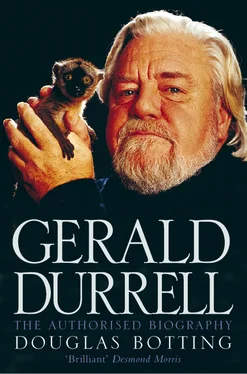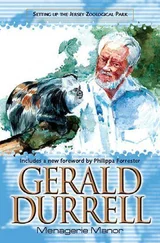The whole place had an atmosphere of ancient melancholy about it, the house with its cracked and peeling walls, the tremendous echoing rooms, its verandas piled high with drifts of last year’s leaves and so overgrown with creepers and vines that the lower rooms were in a perpetual green twilight … The house and land were gently, sadly decaying, lying forgotten on the hillside overlooking the shining sea and dark, eroded hills of Albania.
It was Spiro who found the villa, and Spiro who organised the move – the long line of handcarts piled high with the family’s possessions heading north in the now familiar cloud of white dust. But even after they had moved everything in, the house remained vast and echoing, mainly because much of the decrepit antique furniture that came with it disintegrated at the first touch of a human hand (or bottom). It was big enough for Gerald to be allocated a large room of his own on the first floor – his study, he called it, though to the rest of the family it was known as the Bug House. The Bug House was Gerald’s first true den and centre of operations:
This room smelt pleasantly of ether and methylated spirits. It was here I kept my natural history books, my diary, microscope, dissecting instruments, nets, collecting bags, and other important items. Large cardboard boxes housed my birds’ eggs, beetle, butterfly and dragon-fly collections, while on the shelves above were a fine range of bottles full of methylated spirit in which were preserved such interesting items as a four-legged chicken, various lizards and snakes, frog-spawn in different stages of growth, a baby octopus, three half-grown brown rats (a contribution from Roger), and a minute tortoise, newly hatched, that had been unable to survive the winter. The walls were sparsely, but tastefully, decorated with a slab slate containing the fossilised remains of a fish, a photograph of myself shaking hands with a chimpanzee, and a stuffed bat. I had prepared the bat myself, without assistance, and I was extremely proud of the result.
For Gerald the winter was enlivened by his tea-time natural history lessons every Thursday in Theo’s wonderful study in his flat in Corfu town. The room was packed with books, notebooks, x-ray plates, jars and bottles full of minute freshwater fauna, a telescope pointing at the sky, and a microscope table laden with instruments and slides, where Gerald would sit for hours on end peering transfixed at the mouth-parts of the rat flea, the egg-sacs of the one-eyed cyclops bug, the spinnerets of the cross or garden spider. When the weather improved they ventured out. Theo would come over to the Daffodil-Yellow Villa on foot, followed by his wife Mary and sometimes his young daughter Alexia in Spiro’s taxi; together he and Gerry would sally forth to explore the surrounding countryside, striding out side by side, singing at the top of their voices.
Alan Thomas, on a visit to Corfu, witnessed them setting out on an expedition, Theo in an immaculate white suit and a homburg that would have been a credit to Edward VII, Gerry running alongside, almost dancing with happiness, both of them strapped around with collecting equipment. ‘I turned to Larry,’ Thomas recalled, ‘and I said: “It’s wonderful for Gerry to have Theodore.” And Larry replied: “Yes, Theodore is Gerry’s hero .”’ They always carried a bottle of fresh lemonade and biscuits or sandwiches on these excursions, together with dipping nets and knapsacks and canvas bags full of collecting bottles and boxes and a few clumps of damp moss, for as Theodore explained: ‘Both Gerald and I were more interested in studying live creatures and kept our collection of preserved specimens to a minimum.’
Exploring the countryside with the close concentration of watchmenders, they left no stick or stone unturned, no puddle unexamined. ‘Every water-filled ditch was, to us, a teeming and unexplored jungle,’ Gerald recalled, with the minute cyclops and water-fleas, green and coral pink, suspended like birds among the underwater branches, while on the muddy bottom the tigers of the pool would prowl: the leeches and the dragonfly larvae. Every hollow tree had to be scrutinised in case it should contain a tiny pool of water in which mosquito-larvae were living, every mossy rock had to be overturned to find out what lay beneath it, and every rotten log had to be dissected. On their return they ransacked Mother’s kitchen for soup plates and teaspoons, which they used to sort out their finds before accommodating them in the gravel-bottomed, weed-aired jam jars and sweet bottles that would be their home. Before long, Theo was to recall, they had assembled a ‘whole army corps of aquaria’.
Soon Gerald was setting off from the Daffodil-Yellow Villa and exploring in every direction – always dressed, at his mother’s insistence, in very brightly coloured pullovers so that he could be easily spotted even when he strayed some distance from home. A myrtle-covered hill behind the house was covered with tortoises newly awakened from their winter’s hibernation, and Gerald would spend hours watching their romantic urges revive in the sun. ‘The actual sexual act,’ he was to record, ‘was the most awkward and fumbling thing I have ever seen. The incredibly heavy-handed and inexpert way the male would attempt to hoist himself on to the female shell, overbalancing and almost overturning, was extremely painful to watch; the urge to go and assist the poor creature was almost overwhelming.’ No less intriguing to the twelve-year-old was the sex life of the mantises, and he would stare in horror as the female slowly munched her way through her partner’s head while he proceeded to fertilise her with what was left of his body: a beautifully simple demonstration of the two purposes of life – feeding to ensure the survival of the individual, and copulation to ensure the survival of the species – neatly combined in a single event.
Sometimes Gerald would go out bat-hunting at night, an altogether different adventure in a world metamorphosed by silence and moonlight, where the creatures of the darkness – jackals, foxes, squirrel dormice, nightjars – slipped silently in an out of vision like shadows. Once he found a young Scops owl covered in baby down and took it home, naming him Ulysses. Ulysses was a bird of great strength of character, Gerald noted, and not to be trifled with, so when he grew up he was given the freedom of the Bug House, flying out through the window at night and riding on Roger the dog’s back when Gerald went down to the sea for a late-evening swim.
Gerald now began to collect creatures on a grand scale, and before long his room was so full that he had to house them in various nooks and crannies throughout the villa. This led to some embarrassing, not to say fractious situations, for the rest of the family did not share his affection for the island’s wildlife, and positively objected if they encountered it in the wrong place. For a while the house was infested with giant mosquitoes, whose provenance remained obscure until Theo realised that what Gerald thought were tadpoles in his aquarium were in fact the inch-long, pot-bellied larvae of Theobaldia longeareolata , the largest mosquito on the island. Gerald had been puzzled by the fact that, instead of turning into frogs, they had seemingly been vanishing into thin air. But worse was to follow.
Gerald had long been fascinated by the black scorpion, a particularly venomous version of a species which had a fearsome reputation – as Yani the shepherd once explained, its sting could kill, especially if it managed to crawl into your ear, as had happened to one of Yani’s friends, a young shepherd who died in unspeakable agony. Gerald was never deterred by dangerous animals, however, and in the crumbling wall surrounding the sunken garden of the Daffodil-Yellow Villa he was delighted to discover a whole battalion of black scorpions, each about an inch long. ‘They were weird-looking things,’ he was to write, ‘with their flattened, oval bodies, crooked legs, the enormous crab-like claws, bulbous and neatly jointed as armour, and the tail like a string of brown beads ending in a sting like a rose-thorn.’ At night he would go out with a torch and watch the scorpions’ wonderful courtship dances, claw in claw, tails entwined. ‘I grew very fond of these scorpions. I found them to be pleasant, unassuming creatures with, on the whole, most charming habits.’ Their cannibalism apart.
Читать дальше










